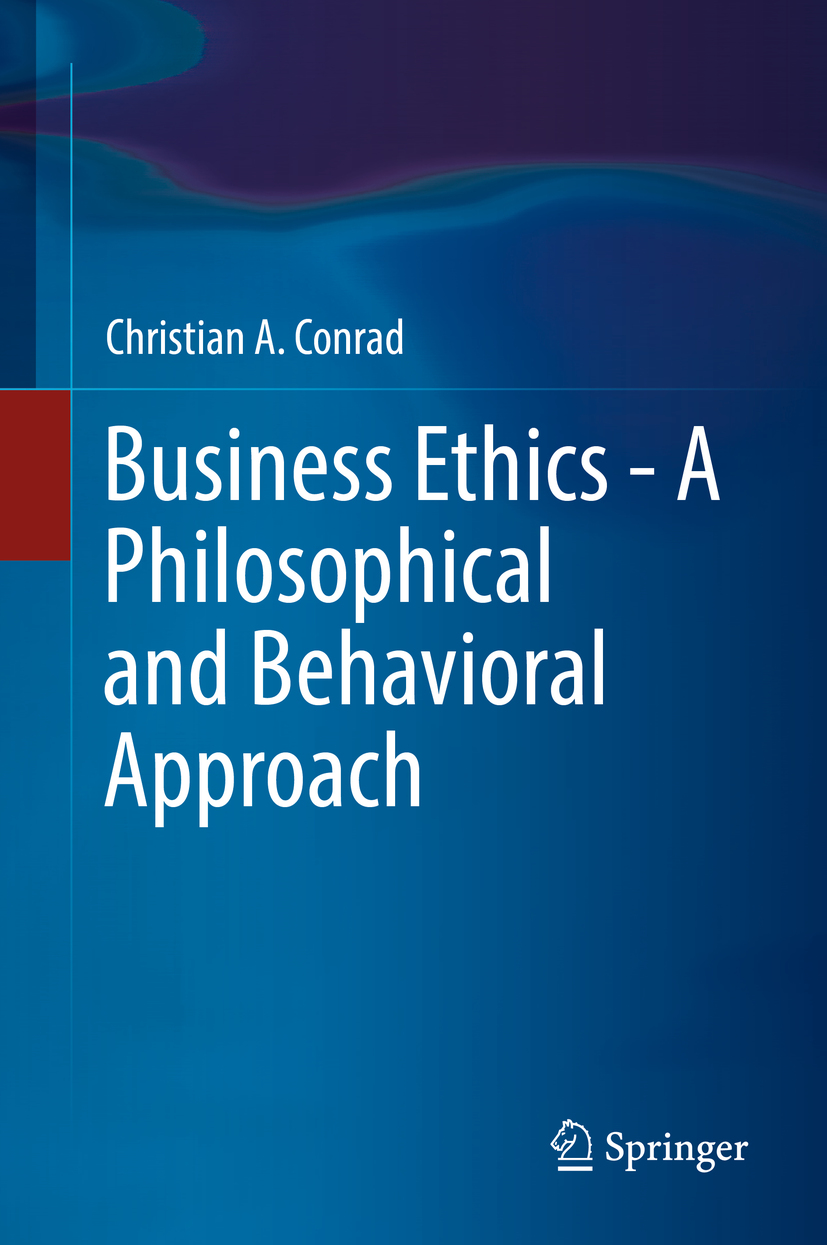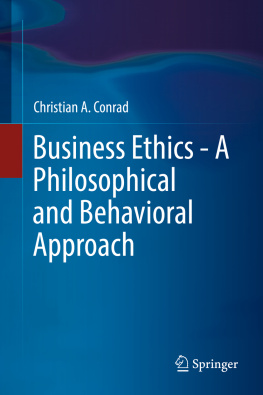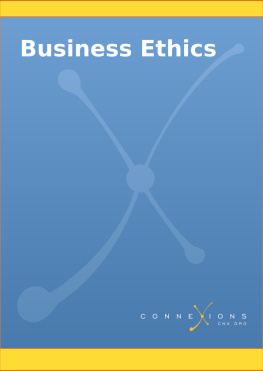Christian A. Conrad - Business Ethics - A Philosophical and Behavioral Approach
Here you can read online Christian A. Conrad - Business Ethics - A Philosophical and Behavioral Approach full text of the book (entire story) in english for free. Download pdf and epub, get meaning, cover and reviews about this ebook. year: 0, publisher: Springer International Publishing, genre: Politics. Description of the work, (preface) as well as reviews are available. Best literature library LitArk.com created for fans of good reading and offers a wide selection of genres:
Romance novel
Science fiction
Adventure
Detective
Science
History
Home and family
Prose
Art
Politics
Computer
Non-fiction
Religion
Business
Children
Humor
Choose a favorite category and find really read worthwhile books. Enjoy immersion in the world of imagination, feel the emotions of the characters or learn something new for yourself, make an fascinating discovery.
- Book:Business Ethics - A Philosophical and Behavioral Approach
- Author:
- Publisher:Springer International Publishing
- Genre:
- Year:0
- Rating:4 / 5
- Favourites:Add to favourites
- Your mark:
- 80
- 1
- 2
- 3
- 4
- 5
Business Ethics - A Philosophical and Behavioral Approach: summary, description and annotation
We offer to read an annotation, description, summary or preface (depends on what the author of the book "Business Ethics - A Philosophical and Behavioral Approach" wrote himself). If you haven't found the necessary information about the book — write in the comments, we will try to find it.
Business Ethics - A Philosophical and Behavioral Approach — read online for free the complete book (whole text) full work
Below is the text of the book, divided by pages. System saving the place of the last page read, allows you to conveniently read the book "Business Ethics - A Philosophical and Behavioral Approach" online for free, without having to search again every time where you left off. Put a bookmark, and you can go to the page where you finished reading at any time.
Font size:
Interval:
Bookmark:


This Springer imprint is published by the registered company Springer International Publishing AG part of Springer Nature.
The registered company address is: Gewerbestrasse 11, 6330 Cham, Switzerland
This book is the result of more than 12 years of professional experience in a large German bank, where I often worked with the management of international companies as a business consultant. The time period of this experience included the boom and crash at the beginning of the new millennium and the financial crisis. These practical impressions led to the conviction that there is a problem with ethics in the economy and that the lack of ethics is not only harmful to people but also leads to serious productivity losses. As a result, I have held seminars on business ethics in the bachelors and masters degree at the University of Applied Science HTW in Saarbrcken. This teaching experience was incorporated into this book as well as an extensive literature study.
I would like to thank Ms. Danica Webb (USA) for the translation of the major part of this book.
The question of whether or not there is a need for ethics in business is still a scientific discussion. However, in the context of the 2000 Enron crisis, the first doubts arose as to whether a business enterprise without morality could work. Since the financial crisis that began in 2007, the economy and business administrations are increasingly confronted with the demand for more social responsibility. A common feature of the crises was the immoral enrichment efforts of managers at the expense of their companies and the system, and thus society. The market economy system places the individual at the forefront of economic value creation and grants him a great freedom of development. The pursuit of self-interest is intended to ensure the greatest possible motivation for the individual, and thus a maximum result for the general public seems to work less and less.
The central question to be answered in this textbook is the extent to which moral values play a role as productive forces for the economy. Our underlying method is a scientific approach. In this case, no normative approach is deliberately pursued and a morality is not demanded a priori by the economy. This morality would have to be subjectively and culturally relativized and could therefore claim no universality. Moral values in themselves, such as the dignity of man, should not be regarded as a requirement profile without logical reasoning, although they have a high target priority. Normative, moral, perhaps even emotional-related goals such as justice should be mentioned, but should not be used for argumentation when they are not productivity-enhancing. The aim is the optimal development of the productive forces in companies and national economy, i.e., the simple increase in welfare through output maximization while taking into account the welfare of all parties involved. A system of ethics founded purely on logic will be devised, one which stimulates the productive forces of the market economy. The aim is to reveal the ethics implied by the market economy, an ethics that can also claim international validity for the globalized economy. We hope to justify and promote ethics objectively and thus convincingly.
The term business ethics encompasses, according to the international standard, the ethics of companies in the business sector (meso level, corporate ethics, organizational ethics), managerial ethics in companies (micro level, personal ethics), and even ethics within the national economic framework (systemic level, economic ethics). The goal is to create a textbook for business ethics from the many ethical approaches and partly also from different conceptual uses. The aim is to show how ethics improves productivity in the economy. For practical application, specific ethics tools are provided.
In order to work out how people behave ethically and unethically and how this affects the economy, this book refers to newer research results from behavioral economics, but also from other disciplines such as psychology and sociology, thus leading to new conclusions for business ethics. The knowledge relevant to the students is first derived scientifically, and then the results are presented as summarized. After the ethical assessment approaches have been explained, the students are given an ethical assessment of economic behavior using case studies. Role-playing and games are also used to explain the behavior of people in relation to ethics.
The book begins with the foundations of business ethics by defining terms and delineating objectives. The importance of ethics for business, the economy, and the society is also discussed here. Then the ethical evaluation approaches are presented, which are intended to enable the reader to evaluate economic behavior ethically. Man in business is the next chapter. Here we will deal with man and his behavior. What motivates him? To what extent is it ethically oriented? Is there a sense of justice? Next, we will discuss the rules of the market. Does the market economy promote ethical behavior or is there a conflict of goals between ethics and market economy? Do companies have a social responsibility? We note that the answers to these questions are very much dependent on the legal framework of economic activity. In an economic anarchy, ethical behavior cannot be expected either by the companies or by the individual actors, which is why we turn to ethics as an ordinance. Here, the state as an actor has an important role to play. After analyzing the importance of ethics for productivity in the enterprise and in the economy, we present so-called ethics tools as the instruments with which the management can promote ethical behavior in their employees. The book concludes with an outlook and recommendations on business ethics as a discipline as part of economic education.
Font size:
Interval:
Bookmark:
Similar books «Business Ethics - A Philosophical and Behavioral Approach»
Look at similar books to Business Ethics - A Philosophical and Behavioral Approach. We have selected literature similar in name and meaning in the hope of providing readers with more options to find new, interesting, not yet read works.
Discussion, reviews of the book Business Ethics - A Philosophical and Behavioral Approach and just readers' own opinions. Leave your comments, write what you think about the work, its meaning or the main characters. Specify what exactly you liked and what you didn't like, and why you think so.











